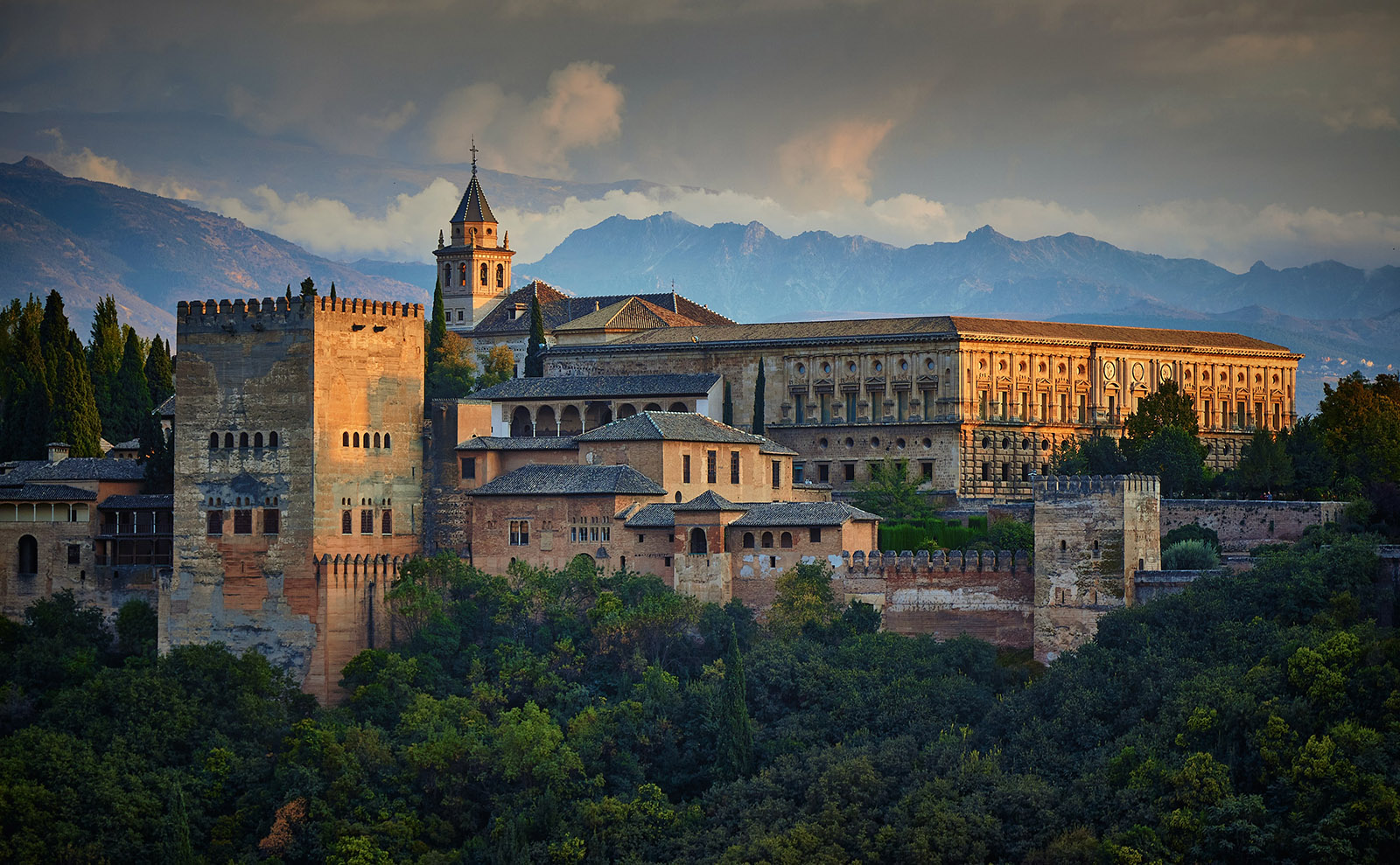
Armchair travel around the world!
Start your reading adventures with our FREE Reading Atlas.

- Around the World in 14 Books
- 7 Thrilling Book Series
- 6 Audiobooks That Are Like Theater For Your Ears



The Alhambra is a jewel of Moorish architecture that stands almost defiantly against the jagged peaks of the Sierra Nevada mountains in northeastern Spain. Imposing walls surround the complex, but inside are beautiful palaces, sun-dappled courtyards, and cool green gardens. There are graceful pointed arches, lacy windows, colorful tile mosaics, and soaring domes — just the place to sit in quiet contemplation.
The Moors crossed the Strait of Gibraltar to Spain in 711. They brought flamenco music and chess; olives, apricots, and dates; and Islam. But in 1492, King Ferdinand and Queen Isabella expelled the Moors from Spain.
Muhammad XII, known as Boabdil, was the last Moorish Sultan of Granada. As the story goes, when he left Spain through the Sierra Nevada mountains, he looked back at the Alhambra and sighed with - longing for the beauty he was leaving behind. The Alhambra and that particular spot in the Alpujarras Pass have inspired artists, writers, and poets for centuries.
It’s now called the Pass of the Moor’s Sigh (Puerto del Suspiro del Moro in Spanish) and is marked with a weather-beaten stone marker — so you, too, can climb into the mountains and look back with a sigh.

Pierre Jules Théophile Gautier (1811-1872) was a French writer, poet, and literary critic. He worked as a journalist to pay the bills, but between those assignments, he traveled the world and wrote about his experiences. His adventures took him all over Europe — England, the Netherlands, Belgium, Germany, Switzerland, Italy, Greece — as far east as Russia and south to Turkey, Algiers, and Egypt.
His many trips to Spain resulted in his 1853 book Wanderings in Spain. Its pages are rich with his personal observations, historical context, and charming 19th-century illustrations. In a passage about visiting the Alhambra, he wrote:
On coming from these obscure passages into this large space inundated with light, you feel an effect similar to that produced by a diorama. It appears to you that an enchanter’s wand has carried you to the East of four or five centuries back. Time, which changes all things in its progress, has in no way modified the aspect of these places, where the apparition of one of the old Moorish sultans… would not cause the least surprise.
You can read Wanderings in Spain on Project Gutenberg and Google Books. (Definitely at least treat yourself to a flip through the pages to enjoy the illustrations.)
Guatier’s poem The Last Sigh of the Moor imagines the dramatic moment when Boabdil said his final adiós to Granada.
A long look and the last.

Emma Lazarus (1849 – 1887) was an American author and activist. She was born into a Sephardic Jewish family in Brooklyn, and wrote her first poems when she was eleven. In her later life, she became an activist for Jewish causes and economic reforms. All of which contributed to her most famous poem The New Colossus, the sonnet she wrote in 1883 to raise money for the construction of a pedestal for the Statue of Liberty. Lines from that work are engraved on a bronze plaque on Lady Liberty’s pedestal.
Like Théophile Gautier, Emma Lazarus traveled to Europe twice in the late 1800s to raise money for Jewish aid organizations. Although she didn’t visit Spain on those trips, she was moved by the story of the expulsion of Jewish people from Spain. (Ferdinand and Isabella were very busy with dastardly schemes in 1492.) Maybe that’s what inspired this poem about the gardens of the Alhambra.
Dating from the 16th century, the Lindaraxa gardens feature fountains and pools, roses and bougainvillea, and the fragrance of orange trees and herbs.
Once behold.
Stand revealed;
Fresh from the snow.
Every hour.
Where she knelt.
Europe slept.
Holdeth sway.
Top image courtesy of Vidar Nordli-Mathisen/Shutterstock.
Want to keep up with our book-related adventures? Sign up for our newsletter!
Can you help us? If you like this article, share it your friends!
Strong Sense of Place is a website and podcast dedicated to literary travel and books we love. Reading good books increases empathy. Empathy is good for all of us and the amazing world we inhabit.
Strong Sense of Place is a listener-supported podcast. If you like the work we do, you can help make it happen by joining our Patreon! That'll unlock bonus content for you, too — including Mel's secret book reviews and Dave's behind-the-scenes notes for the latest Two Truths and a Lie.
Join our Substack to get our FREE newsletter with podcast updates and behind-the-scenes info join in fun chats about books and travel.

We'll share enough detail to help you decide if a book is for you, but we'll never ruin plot twists or give away the ending.
Content on this site is ©2024 by Smudge Publishing, unless otherwise noted. Peace be with you, person who reads the small type.